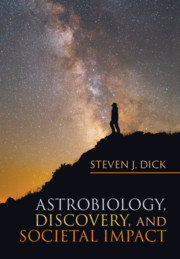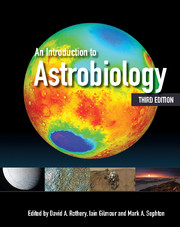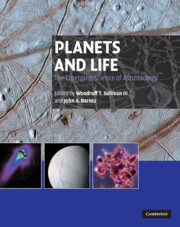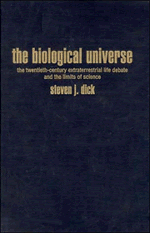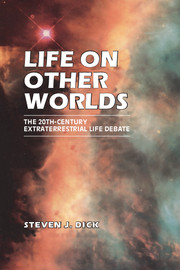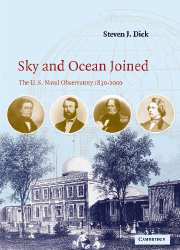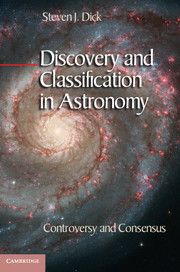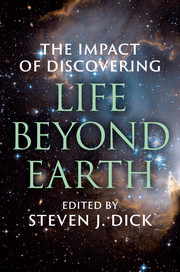Astrobiology, Discovery, and Societal Impact
$38.99 (P)
Part of Cambridge Astrobiology
- Author: Steven J. Dick
- Date Published: October 2020
- availability: In stock
- format: Paperback
- isbn: 9781108445511
$
38.99
(P)
Paperback
Other available formats:
Hardback, eBook
Looking for an examination copy?
If you are interested in the title for your course we can consider offering an examination copy. To register your interest please contact [email protected] providing details of the course you are teaching.
-
The search for life in the universe, once the stuff of science fiction, is now a robust worldwide research program with a well-defined roadmap probing both scientific and societal issues. This volume examines the humanistic aspects of astrobiology, systematically discussing the approaches, critical issues, and implications of discovering life beyond Earth. What do the concepts of life and intelligence, culture and civilization, technology and communication mean in a cosmic context? What are the theological and philosophical implications if we find life - and if we do not? Steven J. Dick argues that given recent scientific findings, the discovery of life in some form beyond Earth is likely and so we need to study the possible impacts of such a discovery and formulate policies to deal with them. The remarkable and often surprising results are presented here in a form accessible to disciplines across the sciences, social sciences, and humanities.
Read more- Explores the humanistic aspects of the discovery of extraterrestrial life, making use of philosophy, science, theology, anthropology, history, and science fiction
- This subject is one of the most popular themes in astronomy, and this volume is accessible to a broad audience, including students of humanities, social, and natural sciences, and the interested general reader
- Offers the first systematic view of the impact of discovering life beyond Earth, including controversial subjects such as METI (Messaging Extraterrestrial Intelligence)
- Presents a coherent case of what the implications of finding life might be and why we should tackle them now
Awards
- Winner, 2019 PROSE Award for Cosmology and Astronomy
Reviews & endorsements
'At last, a comprehensive and level-headed analysis of what it means for humanity should we discover alien life - an event that would utterly transform our worldview. Steven J. Dick, the world’s foremost scholar in this field, leads us from the lessons of history to the tantalizing promise of astrobiology’s emerging technologies. Admirably, he does not shy away from confronting the ethical, societal and theological ramifications that most commentators fudge. This is a ‘must-buy’ book for anyone who thinks seriously about the age-old question of whether or not we alone in the universe.' Paul Davies, Arizona State University, and author of The Eerie Silence: Are We Alone in the Universe?
See more reviews'We (primarily the space agencies and the scientific community of Astrobiology) are currently engaged in a grand exploration, seeking life beyond Earth. It is past time that we make plans for what the discovery of distant life - microbial, intelligent, or other - would mean for terrestrial life. What will be the impacts as we destructure one set of world views and restructure another? What do we know about humans and their institutions that will help us plan proactively for a transition to a biological universe, if and when that occurs? What policies must we pre-enact to guide any first contact to an outcome deemed satisfactory by all concerned? These are just some of the questions posed by Steven J. Dick in this scholarly and fascinating book that makes the case for the further inclusion of the humanities and social sciences within Astrobiology. While many of these questions are now unanswerable, this work provides a roadmap for how we might arrive at what is knowable in advance of a discovery.' Jill Tarter, SETI Institute
Customer reviews
Not yet reviewed
Be the first to review
Review was not posted due to profanity
×Product details
- Date Published: October 2020
- format: Paperback
- isbn: 9781108445511
- length: 394 pages
- dimensions: 243 x 169 x 20 mm
- weight: 0.77kg
- availability: In stock
Table of Contents
Introduction. When biospheres collide
Part I. Approaches:
1. History
2. Discovery
3. Analogy
Part II. Critical Issues:
4. Can we transcend anthropocentrism?
5. Is human knowledge universal?
6. How can we envision impact?
Part III. Impact!:
7. Astroculture: transforming our worldviews
8. Astroethics: interacting with alien life
9. Astropolicy: preparing for discovery
10. Summary and conclusions: at home in the biological (or postbiological) universe
Bibliography
Index.
Sorry, this resource is locked
Please register or sign in to request access. If you are having problems accessing these resources please email [email protected]
Register Sign in» Proceed
You are now leaving the Cambridge University Press website. Your eBook purchase and download will be completed by our partner www.ebooks.com. Please see the permission section of the www.ebooks.com catalogue page for details of the print & copy limits on our eBooks.
Continue ×Are you sure you want to delete your account?
This cannot be undone.
Thank you for your feedback which will help us improve our service.
If you requested a response, we will make sure to get back to you shortly.
×
